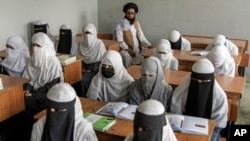U.N. Secretary General Antonio Guterres Friday renewed his call for Afghanistan’s Taliban rulers to allow teenage girls to resume secondary education, saying “girls belong in schools.”
“Girls in Afghanistan continue to be locked out of the classroom,” he said on Twitter late Friday.
The Islamist group banned female students above the sixth grade from resuming classes across most Afghan provinces since they reclaimed power a year ago. The Taliban called it a temporary suspension but have refused to lift the ban, despite international pressure.
"This is an unjustifiable violation of equal rights that damages the entire country. Girls belong in school," Guterres said on Twitter.
Critics say the ban has denied an entire generation access to education in Afghanistan, with devastating consequences for high school-aged girls and their families.
The Taliban had imposed a complete ban on girls’ education when they were previously in power from 1996 to 2001.
The hardline insurgent group took control of Afghanistan in August of last year when all U.S.-led foreign forces withdrew from the country, marking an end to nearly two decades of war with the Taliban. The internationally recognized government’s security forces collapsed in the face of nationwide insurgent attacks.
The Taliban have brought security to much of Afghanistan, but their curbs on women’s rights and on civil liberties have drawn global denunciation, leading to the country’s international isolation.
Taliban leaders have defended their polices and restrictions on women as in line with Afghan culture and Sharia, or Islamic law, dismissing international calls for reforms as an interference in Afghanistan’s internal affairs.
An already bad humanitarian crisis and the growing economic turmoil stemming from the Taliban takeover have plunged most of the poverty-stricken country’s estimated 40 million population into deeper poverty.
New Afghan envoy
Guterres late Friday announced the appointment of Kyrgyzstan’s former president, Roza Otunbayeva, as his new special envoy for Afghanistan. She succeeds Deborah Lyons of Canada as head of the U.N. Assistance Mission in Afghanistan, known as UNAMA.
Otunbayeva will oversee U.N. humanitarian operations and dealings with the Taliban. She served as president of Kyrgyzstan from 2010 to 2011.
U.N. humanitarian chief Martin Griffiths warned the Security Council August 29 that Afghanistan faces deepening poverty, with 6 million people suffering severe food shortages stemming from humanitarian, economic, climate and financial crises.
"We worry" those figures will soon worsen as winter weather sends already high fuel and food prices skyrocketing, Griffiths said.




